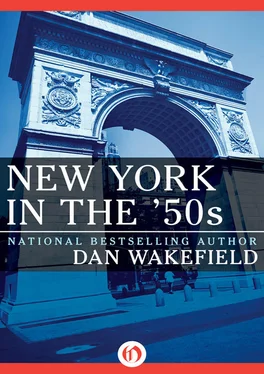“We doped it all out very dispassionately,” Max recalls. “We decided a young man could move faster on the Trib at that time. We both wanted to go the political-journalism route, covering City Hall, then Albany, then Washington and national politics. Dave decided to stay at the Trib , so later he whispered in Nancy Edwards’s ear about me being the best person to replace her. She’d been at the Graduate School of Journalism and was going to work on the Times ’s society page—the opening women got in those days. She told the Times she had this great candidate for campus correspondent, but their jaws fell open when she said I was only a sophomore. Why shouldn’t they hire someone from the journalism school? She said, ‘This guy spends all day at Spectator , he knows all the stories coming in—you’re getting fifty reporters instead of one.’ They hired me.”
Going out for Spec was my own entrée into the life of Columbia, and soon I was covering stories I’d never seen in Indiana, from crew races at Cornell to Broadway and TV actresses, who would appear in the Lions’ Den, the dorm restaurant, to be crowned queen of some prom or other. “‘That ain’t Dagmar,’ said a confused Columbia man” was the lead of my first story, quoting a student who stumbled into the wrong coronation while looking for the famously buxom blonde who was one of the first celebrities created by television.
I elbowed my way through the homecoming crowd on assignment from Spec to get photos of Ike, on leave from the presidency of Columbia to run for the U.S. presidency. He was making a campaign stop at this pregame picnic lunch by the football field, and I snapped my Rolleiflex as he gnawed fried chicken with the faculty and tried to smile.
Homespun Ike never seemed comfortable at intellectual Columbia. “Dammit, what good are exceptional physicists … exceptional anything, unless they are exceptional Americans?” he fumed, questioning a university scholar. In the rah-rah fifties rhetoric he helped create, Eisenhower urged Columbia to become “a more effective and productive member of the American national team.” He surely felt even more out of tune with Columbia’s student body that fall, when the Spectator published a front-page editorial supporting Adlai Stevenson for president and described the Eisenhower campaign as “the Great Disenchantment.”
As I worked more for Spec , I got to be friends with Max Frankel’s successor as editor, a hard-driving newsman named Jerry Landauer, who seemed to be born with journalistic genes. Jerry was a lean and muscular man with a blond crew cut who reminded me of a student version of a Front Page reporter. He was literally a dashing figure, popping up wherever a story was breaking on campus with pencil poised, tie loosened, ready to fire the right question with the speed and accuracy of a bullet. Reporting came naturally to Jerry, but he sweated over the writing, fiercely rubbing his bristling hair while he composed sentences behind a typewriter or sat up late consuming black coffee at the counter of Chock Full O’ Nuts on Broadway.
“Dammit, Danny! I wish I could write like you,” Jerry said, throwing an arm around my shoulder and shaking his head as we hurried to the V & T Pizzeria on Amsterdam. He was the only college friend who called me Danny, the childhood name I wanted to leave behind in Indiana, but from Jerry I didn’t mind it. How could I complain when he praised me like that?
“But Jerry,” I always replied, “you’re the best damn reporter. I never ask the right questions like you.”
“Ah, to hell with it, Danny. You can write .”
This exchange continued throughout our long friendship. Jerry went on to become an investigative reporter in Washington for the Wall Street Journal , and I’d go down there on assignments for The Nation, Esquire , and The Atlantic , in the sixties and seventies, and sleep on his living room couch. I wasn’t surprised when he broke a top story by rooting in a wastebasket in a Senate hearing room after everyone had left, finding on a wadded scrap of paper a witness’s doodles that provided the clue to hidden corruption.
Judah L. Berger, called Joe, had Jerry’s intensity but wasn’t as totally focused on journalism and Spec , even though he became its managing editor. He saw the study of history as a key to understanding what made things, and even people, tick—the way some of us looked to literature or psychology for clues to the human condition, and hoped to find answers to our own. Joe’s favorite course was a class in American history taught by Lee Benson, a lively young instructor who was writing a book on a mundane topic he presented with the passion of high drama, as if it held the mystery and meaning of the universe: Merchants, Farmers, and Railroads .
Joe Berger was fascinated by Benson’s obsession with his subject. “Railroads,” Joe said, leaning forward, his eyes wide with amusement and awe. “Imagine, Wake-o, everything working out the way it has because of railroads!”
Who was the glamorous girl with Sam Astrachan, our fledgling novelist who paced Broadway late at night with his hands clasped behind his back? Sam was standing outside the College Inn restaurant on Broadway one early February evening in 1955 with this tall, attractive girl who had shiny black hair, bright red lipstick, and a long black coat with a fur collar. Sam, in his customary black suit and white shirt with no tie, was smiling more broadly than usual, and invited me to come to the West End Bar & Grill and have a drink with him and “Zelda.”
She was really Jane Richmond, and she could have passed for a twenties flapper that night. She loved the legend surrounding Zelda and Scott Fitzgerald, our generation’s idols of literary glamour and doom. Jane had published a story in Focus , the Barnard literary magazine (the undergraduate women’s counterpart to The Columbia Review , as the Barnard Bulletin was their Spectator ). Gender segregation of publications, as well as classrooms, was taken for granted; the problem was, Jane told us, there was no equivalent of Columbia’s humor magazine. She and her friends wanted to start their own, a Barnard version of Jester . “We want to call it Shvester ,” she said. “It’s Yiddish for ‘sister.’”
We agreed it was a great idea, but it never came to be.
“I was a literary girl, a writing major,” Jane says, looking back. She won the Elizabeth Janeway Writing Prize when she graduated, started writing for the satirical television show of the sixties, “That Was the Week That Was,” wrote scripts for “Kate and Allie,” and continued her lifelong love of writing short stories, which have appeared in The New Yorker and other magazines.
Though Barnard girls were segregated from Columbia’s undergraduate classes and publications, they were welcomed at the West End, whose notorious allure was unintentionally enhanced by Diana Trilling, Lionel’s wife and herself a literary critic. Mrs. Trilling immortalized the place in a Partisan Review piece as “that dim waystation of undergraduate debauchery on Morningside Heights.” She compared it unfavorably to the “well-lighted” Stewart Cafeteria, a popular literary hangout in her day.
With a horseshoe-shaped bar, a steam table offering stews and other student bargains, plus wooden booths and a jukebox, the West End was the all-purpose off-campus hangout for Columbia and Barnard. It provided a respite from academia as a place to go for drinks, dates, and fun, and also served as a haven where students could moan about their troubles over a beer. When the threat of being drafted to fight in Korea struck Columbia men at the start of the decade, they knew where to go for comfort. The editors of Spec reported: “Rumors that the college ranks would be depleted by the end of the year [1951] caused many to lose faith and many more to find solace in the West End.”
Читать дальше












